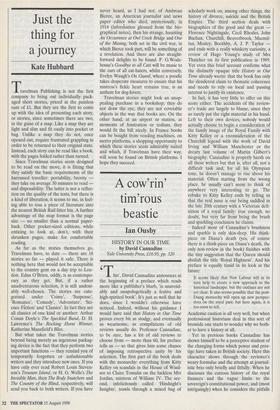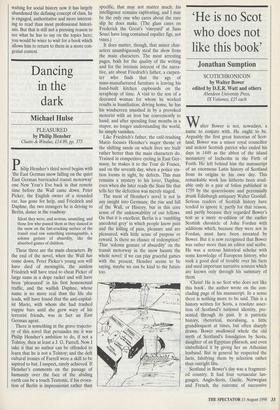A cow'rin' tim'rous beastie
Ian Ousby
HISTORY IN OUR TIME by David Cannadine Yale University Press, £16.95, pp. 320 This', David Cannadine announces at the beginning of a preface which reads more like a publisher's blurb, 'is unavoid- ably and unapologetically a festive and high-spirited book'. It's just as well that he does, since I wouldn't otherwise have noticed. Indeed, without his guidance I would have said that History in Our Time proves every bit as stodgy, and eventually as wearisome, as compilations of old reviews usually do. Professor Cannadine, to be sure, has a lot of old reviews to choose from — more than 60, his preface tells us — so that gives him some chance of imposing retrospective unity by his selection. The first part of the book deals with the monarchy: everything from Kitty Kelley on scandals in the House of Wind- sor to Claire Tomalin on the luckless Mrs Jordan, mistress of William IV. The sec- ond, infelicitously called 'Hindsight's Insights', trawls through a mixed bag of scholarly work on, among other things, the history of divorce, suicide and the British Empire. The third section deals with biographies of the good and the great Florence Nightingale, Cecil Rhodes, John Buchan, Churchill, Beaverbrook, Macmil- lan, Mosley, Boothby, A. J. P. Taylor and ends with a really whiskery curiosity, a review of Hugo Young's study of Mrs Thatcher on its first publication in 1989. Yet even this brief account confirms what the distinctly opaque title History in Our Time already warns: that the book has only the slenderest claim to thematic coherence and needs to rely on local and passing interest to justify its existence.
In fact, it has very little to offer on this score either. The accidents of the review- er's trade are largely to blame, since they so rarely put the right material in his hand. Left to their own devices, nobody would actually choose to begin a consideration of the family image of the Royal Family with Kitty Kelley or a reconsideration of the Churchill legend with the work of David Irving and William Manchester or the dreary last volume of Martin Gilbert's biography. Cannadine is properly harsh on all these writers but that is, after all, not a difficult task and, for all his Olympian tone, he doesn't manage to rise above his material. Often starting from the wrong place, he usually can't seem to think of anywhere very interesting to go. The rebuke to Kitty Kelley ends by telling us that the real issue is our being saddled in the late 20th century with a Victorian defi- nition of a royal family: true enough, no doubt, but very far from being the brash and sparkling conclusion he claims.
Indeed most of Cannadine's brashness and sparkle is only skin-deep. His think- piece on Diana's death (yes, of course there is a think-piece on Diana's death, the only non-review in the book) finishes with the tiny suggestion that the Queen should abolish the title 'Royal Highness'. And his preface is equally timid in its look at the future: It seems likely that New Labour will in its turn help to create a new approach to the historical landscape: but the outlines are not yet clear. It also seems possible that the post- Diane monarchy will open up new perspec- tives on the royal past: but here again, it is too soon to tell.
Academic caution is all very well, but when professional historians deal in this sort of bromide one starts to wonder why we both- er to have a history at all.
Yet in previous books Cannadine has shown himself to be a perceptive student of the changing forms which power and pres- tige have taken in British society. Here this character shows through the reviewer's weary formulae and the attempt at journal- istic brio only briefly and fitfully. When he discusses the curious history of the royal finances and the vague limits to the sovereign's constitutional power, and (most intriguingly) when he considers the pitfalls waiting for social history now it has largely abandoned the defining concept of class, he is engaged, authoritative and more interest- ing to read than most professional histori- ans. But that is still not a pressing reason to see what he has to say on the topics here; you would be wiser to wait for a book which allows him to return to them in a more con- genial context.



























































 Previous page
Previous page